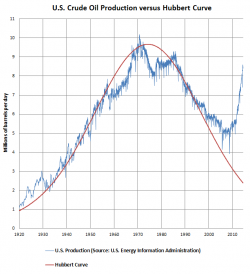Peak Oil
Jump to navigation
Jump to search
 | |
| Interest of | • William Engdahl • Richard Heinberg • James Howard Kunstler • Kunstler.com • Robert Mabro • Oilgeopolitics.net • Dmitry Orlov • Set America Free Coalition |
| The point in time when the maximum rate of extraction of petroleum is reached, after which the rate of production enters terminal decline. | |
Official Narrative
Wikipedia notes "Historical US crude oil production showing initial similarity to a Hubbert curve".[1] Its definition, too "the point in time when the maximum rate of extraction of petroleum is reached, after which the rate of production is expected to enter terminal decline" could have been calculated to downplay the seriousness of one of the defining phenomena of the modern age.
Problems
The use of tar sands in a desperate effort to stave off peak oil is exacerbating already serious ecological problems such as global warming and lack of fresh water.
Related Documents
| Title | Type | Publication date | Author(s) | Description |
|---|---|---|---|---|
| Document:The So-Called Evidence Is a Farce | article | 10 October 2001 | Stan Goff | 'What they are responding to is not September 11th, but the beginning of a permanent and precipitous decline in worldwide oil production, the beginning of a deep and protracted worldwide recession, and the unraveling of the empire.' |
| File:LloydsPeakOilReport.pdf | report | 2010 | Antony Froggart Glada Lahn | A report on "Sustainable Energy Security". |
| File:Searching for a Miracle.pdf | report | September 2009 | Richard Heinberg |
Many thanks to our Patrons who cover ~2/3 of our hosting bill. Please join them if you can.